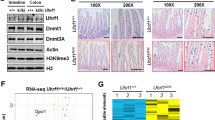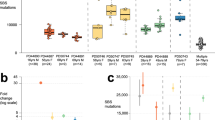Abstract
O6-methylguanine DNA methyltransferase (MGMT) suppresses mutations and cell death that result from alkylation damage. MGMT expression is lost by epigenetic silencing in a variety of human cancers including nearly half of sporadic colorectal cancers, suggesting that this loss maybe causal. Using mice with a targeted disruption of the Mgmt gene, we tested whether Mgmt protects against azoxymethane (AOM)-induced colonic aberrant crypt foci (ACF), against AOM and dextran sulfate sodium (DSS)-induced colorectal adenomas and against spontaneous intestinal adenomas in ApcMin mice. We also examined the genetic interaction of the Mgmt null gene with a DNA mismatch repair null gene, namely Msh6. Both Mgmt and Msh6 independently suppress AOM-induced ACF, and combination of the two mutant alleles had a multiplicative effect. This synergism can be explained entirely by the suppression of alkylation-induced apoptosis when Msh6 is absent. In addition, following AOM+DSS treatment Mgmt protected against adenoma formation to the same degree as it protected against AOM-induced ACF formation. Finally, Mgmt deficiency did not affect spontaneous intestinal adenoma development in ApcMin/+ mice, suggesting that Mgmt suppresses intestinal cancer associated with exogenous alkylating agents, and that endogenous alkylation does not contribute to the rapid tumor development seen in ApcMin/+ mice.
This is a preview of subscription content, access via your institution
Access options
Subscribe to this journal
Receive 50 print issues and online access
$259.00 per year
only $5.18 per issue
Buy this article
- Purchase on Springer Link
- Instant access to full article PDF
Prices may be subject to local taxes which are calculated during checkout




Similar content being viewed by others
Abbreviations
- ACF:
-
Aberrant crypt foci
- AOM:
-
Azoxymethane
- DSS:
-
Dextran sulfate sodium
- Mgmt:
-
O6-methylguanine-DNA methyltransferase
- O6MeG:
-
O6-methylguanine
References
Acharya S, Wilson T, Gradia S, Kane MF, Guerrette S, Marsischky GT et al. (1996). hMSH2 forms specific mispair-binding complexes with hMSH3 and hMSH6. Proc Natl Acad Sci USA 93: 13629–13634.
Aquilina G, Biondo R, Dogliotti E, Meuth M, Bignami M . (1992). Expression of the endogenous O6-methylguanine-DNA-methyltransferase protects Chinese hamster ovary cells from spontaneous G:C to A:T transitions. Cancer Res 52: 6471–6475.
Baker SM, Harris AC, Tsao JL, Flath TJ, Bronner CE, Gordon M et al. (1998). Enhanced intestinal adenomatous polyp formation in Pms2−/−;Min mice. Cancer Res 58: 1087–1089.
Edelmann W, Yang K, Kuraguchi M, Heyer J, Lia M, Kneitz B et al. (1999). Tumorigenesis in Mlh1 and Mlh1/Apc1638N mutant mice. Cancer Res 59: 1301–1307.
Edelmann W, Yang K, Umar A, Heyer J, Lau K, Fan K et al. (1997). Mutation in the mismatch repair gene Msh6 causes cancer susceptibility. Cell 91: 467–477.
Esteller M, Corn PG, Baylin SB, Herman JG . (2001). A gene hypermethylation profile of human cancer. Cancer Res 61: 3225–3229.
Fang Q, Kanugula S, Pegg AE . (2005). Function of domains of human O6-alkylguanine-DNA alkyltransferase. Biochemistry 44: 15396–15405.
Fox EJ, Leahy DT, Geraghty R, Mulcahy HE, Fennelly D, Hyland JM et al. (2006). Mutually exclusive promoter hypermethylation patterns of hMLH1 and O6-methylguanine DNA methyltransferase in colorectal cancer. J Mol Diagn 8: 68–75.
Glassner BJ, Weeda G, Allan JM, Broekhof JLM, Carls NHE, Donker I et al. (1999). DNA repair methyltransferase (Mgmt) knockout mice are sensitive to the lethal effects of chemotherapeutic alkylating agents. Mutagenesis 14: 339–347.
Haigis KM, Caya JG, Reichelderfer M, Dove WF . (2002). Intestinal adenomas can develop with a stable karyotype and stable microsatellites. Proc Natl Acad Sci USA 99: 8927–8931.
Harris LC, Potter PM, Tano K, Shiota S, Mitra S, Brent TP . (1991). Characterization of the promoter region of the human O6-methylguanine-DNA methyltransferase gene. Nucleic Acids Res 19: 6163–6167.
Hecht SS . (1999). DNA adduct formation from tobacco-specific N-nitrosamines. Mutat Res 424: 127–142.
Hickman MJ, Samson LD . (1999). Role of DNA mismatch repair and p53 in signaling induction of apoptosis by alkylating agents. Proc Natl Acad Sci USA 96: 10764–10769.
Jiricny J . (2006). The multifaceted mismatch-repair system. Nat Rev Mol Cell Biol 7: 335–346.
Kaina B . (2003). DNA damage-triggered apoptosis: critical role of DNA repair, double-strand breaks, cell proliferation and signaling. Biochem Pharmacol 66: 1547–1554.
Kaina B, Ziouta A, Ochs K, Coquerelle T . (1997). Chromosomal instability, reproductive cell death and apoptosis induced by O6-methylguanine in Mex−, Mex+ and methylation-tolerant mismatch repair compromised cells: facts and models. Mutat Res 381: 227–241.
Karran P, Bignami M . (1992). Self-destruction and tolerance in resistance of mammalian cells to alkylation damage. Nucleic Acids Res 20: 2933–2940.
Kat A, Thilly WG, Fang WH, Longley MJ, Li GM, Modrich P . (1993). An alkylation-tolerant, mutator human cell line is deficient in strand-specific mismatch repair. Proc Natl Acad Sci USA 90: 6424–6428.
Kawate H, Sakumi K, Tsuzuki T, Nakatsuru Y, Ishikawa T, Takahashi S et al. (1998). Separation of killing and tumorigenic effects of an alkylating agent in mice defective in two of the DNA repair genes. Proc Natl Acad Sci USA 95: 5116–5120.
Kellett M, Potten CS, Rew DA . (1992). A comparison of in vivo cell proliferation measurements in the intestine of mouse and man. Epithelial Cell Biol 1: 147–155.
Kohonen-Corish MR, Daniel JJ, te Riele H, Buffinton GD, Dahlstrom JE . (2002). Susceptibility of Msh2-deficient mice to inflammation-associated colorectal tumors. Cancer Res 62: 2092–2097.
Kuraguchi M, Yang K, Wong E, Avdievich E, Fan K, Kolodner RD et al. (2001). The distinct spectra of tumor-associated Apc mutations in mismatch repair-deficient Apc1638N mice define the roles of MSH3 and MSH6 in DNA repair and intestinal tumorigenesis. Cancer Res 61: 7934–7942.
Larson K, Sahm J, Shenkar R, Strauss B . (1985). Methylation-induced blocks to in vitro DNA replication. Mutat Res 150: 77–84.
Lind GE, Thorstensen L, Lovig T, Meling GI, Hamelin R, Rognum TO et al. (2004). A CpG island hypermethylation profile of primary colorectal carcinomas and colon cancer cell lines. Mol Cancer 3: 28.
Millar CB, Guy J, Sansom OJ, Selfridge J, MacDougall E, Hendrich B et al. (2002). Enhanced CpG mutability and tumorigenesis in MBD4-deficient mice. Science 297: 403–405.
Myrnes B, Norstrand K, Giercksky KE, Sjunneskog C, Krokan H . (1984). A simplified assay for O6-methylguanine-DNA methyltransferase activity and its application to human neoplastic and non-neoplastic tissues. Carcinogenesis 5: 1061–1064.
Nagasaka T, Goel A, Notohara K, Takahata T, Sasamoto H, Uchida T et al. (2008). Methylation pattern of the O6-methylguanine-DNA methyltransferase gene in colon during progressive colorectal tumorigenesis. Int J Cancer 122: 2429–2436.
Reitmair AH, Cai JC, Bjerknes M, Redston M, Cheng H, Pind MT et al. (1996). MSH2 deficiency contributes to accelerated APC-mediated intestinal tumorigenesis. Cancer Res 56: 2922–2926.
Sakumi K, Shiraishi A, Shimizu S, Tsuzuki T, Ishikawa T, Sekiguchi M . (1997). Methylnitrosourea-induced tumorigenesis in MGMT gene knockout mice. Cancer Res 57: 2415–2418.
Sandercock LE, Kwok MC, Luchman HA, Mark SC, Giesbrecht JL, Samson LD et al. (2004). Mutational-reporter transgenes rescued from mice lacking either Mgmt, or both Mgmt and Msh6 suggest that O6-alkylguanine-induced miscoding does not contribute to the spontaneous mutational spectrum. Oncogene 23: 5931–5940.
Sedgwick B . (1997). Nitrosated peptides and polyamines as endogenous mutagens in O6-alkylguanine-DNA alkyltransferase deficient cells. Carcinogenesis 18: 1561–1567.
Sieber OM, Howarth KM, Thirlwell C, Rowan A, Mandir N, Goodlad RA et al. (2004). Myh deficiency enhances intestinal tumorigenesis in multiple intestinal neoplasia (ApcMin/+) mice. Cancer Res 64: 8876–8881.
Snow ET, Foote RS, Mitra S . (1984). Base-pairing properties of O6-methylguanine in template DNA during in vitro DNA replication. J Biol Chem 259: 8095–8100.
Sohn OS, Fiala ES, Requeijo SP, Weisburger JH, Gonzalez FJ . (2001). Differential effects of CYP2E1 status on the metabolic activation of the colon carcinogens azoxymethane and methylazoxymethanol. Cancer Res 61: 8435–8440.
Stojic L, Brun R, Jiricny J . (2004). Mismatch repair and DNA damage signalling. DNA Repair (Amst) 3: 1091–1101.
Taniguchi K, Kakinuma S, Tokairin Y, Arai M, Kohno H, Wakabayashi K et al. (2006). Mild inflammation accelerates colon carcinogenesis in Mlh1-deficient mice. Oncology 71: 124–130.
Toft NJ, Sansom OJ, Brookes RA, Arends MJ, Wood M, Margison GP et al. (2000). In vivo administration of O(6)-benzylguanine does not influence apoptosis or mutation frequency following DNA damage in the murine intestine, but does inhibit P450-dependent activation of dacarbazine. Carcinogenesis 21: 593–598.
Toft NJ, Winton DJ, Kelly J, Howard LA, Dekker M, te Riele H et al. (1999). Msh2 status modulates both apoptosis and mutation frequency in the murine small intestine. Proc Natl Acad Sci USA 96: 3911–3915.
Vogelstein B, Kinzler KW . (1993). The multistep nature of cancer. Trends Genet 9: 138–141.
Wali RK, Skarosi S, Hart J, Zhang Y, Dolan ME, Moschel RC et al. (1999). Inhibition of O(6)-methylguanine-DNA methyltransferase increases azoxymethane-induced colonic tumors in rats. Carcinogenesis 20: 2355–2360.
Xiao W, Samson L . (1993). In vivo evidence for endogenous DNA alkylation damage as a source of spontaneous mutation in eukaryotic cells. Proc Natl Acad Sci USA 90: 2117–2121.
Xu-Welliver M, Pegg AE . (2002). Degradation of the alkylated form of the DNA repair protein, O(6)-alkylguanine-DNA alkyltransferase. Carcinogenesis 23: 823–830.
Zaidi NH, Pretlow TP, O’Riordan MA, Dumenco LL, Allay E, Gerson SL . (1995). Transgenic expression of human MGMT protects against azoxymethane-induced aberrant crypt foci and G to A mutations in the K-ras oncogene of mouse colon. Carcinogenesis 16: 451–456.
Acknowledgements
This research was supported by NIH Grants ES02109 and CA75576. We acknowledge the MIT CCR Histology facility (NCI Grant: CA14051), especially Alicia Caron. LDS is an American Cancer Society Research Professor.
Author information
Authors and Affiliations
Corresponding author
Rights and permissions
About this article
Cite this article
Bugni, J., Meira, L. & Samson, L. Alkylation-induced colon tumorigenesis in mice deficient in the Mgmt and Msh6 proteins. Oncogene 28, 734–741 (2009). https://doi.org/10.1038/onc.2008.426
Received:
Revised:
Accepted:
Published:
Issue Date:
DOI: https://doi.org/10.1038/onc.2008.426



